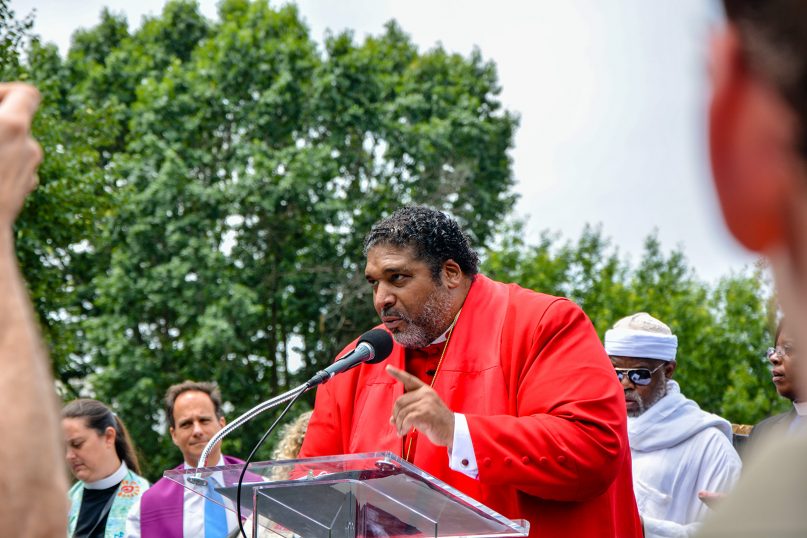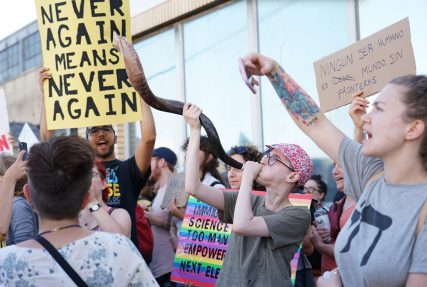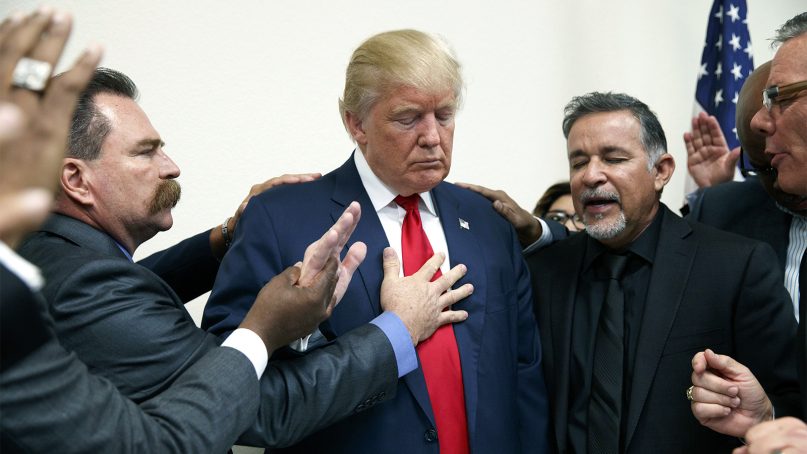(RNS) — “They hate religion,” wrote New York Times columnist Timothy Egan recently in a column titled “Why People Hate Religion,” “because, at a moment to stand up and be counted on the right side of history, religion is used as moral cover for despicable behavior.”
This is true only if you see religion as synonymous with white evangelical Christianity, the group that, polls confirm, shows high support for President Donald Trump. While Egan tips his hat to Catholics who are doing charitable work, it’s clear that by “religion” he means the religious right.
But there are many of us people of faith in America as well who are taking a stand on the right side of history. Religion, in fact, is at the heart of resistance in the age of Trump. In an era where historic structural injustices have become mainstream policy, many turn to religion as a moral compass and inspiration for activism.
This includes communities of color and minorities of faith working tirelessly as on-the-ground activists every day, despite being singled out for abuse by the administration.

The Muslims for Migrants LaunchGood campaign. Courtesy image
A Muslim-led fundraising project has raised more than $150,000 for bail of parents detained in immigration jails. The Muslims for Migrants campaign is dedicating the money to pay bond for immigrants caught up in the xenophobic and oppressive policy that targets desperate families. They have so far contributed to the release of 10 parents.
The director of the project, Tarek El-Messidi, cites the teachings of Islam as the impetus for his activism. In Islam, charity in the form of zakat and sadaqah are at the core of social justice work. It is religion that inspires him.
The Sikh community also has a long history of social justice work drawn from the ethical teachings of Guru Nanak, who teaches Sikhs are responsible to speak against injustice done to others. When faced with an Islamophobic attack where the abuser racially profiled Canadian Sikh politician Jagmeet Singh as a Muslim, he responded not by correcting her error but with solidarity, love and patience. He said, “My response to Islamophobia has never been to say ‘I am not Muslim.’”
Black Christian leaders such as the Rev. William Barber II recently led a protest march in El Paso, Texas, where a few weeks later a mass shooter would target immigrants. He called for a moral awakening to the humanitarian crisis at the Southern border, urged Christians to work to address the desperate and inhumane conditions in refugee camps and called for a halt on detentions and deportations.
Barber’s message was a clear invocation of the biblical teachings on treatment of the stranger in the Gospel of Matthew. He called for a moral and humanitarian movement to liberate our immigrant brothers and sisters.

The Rev. William Barber II speaks during a rally protesting against President Donald Trump’s policies outside the White House in Washington on June 12, 2019. RNS photo by Jack Jenkins
Around the country, people of faith turn to religion to make sense of the world they live in and draw inspiration from ethical teachings to motivate their activism.
To be sure, these grassroots movements by communities of faith are often obscured by the louder and attention-grabbing support some powerful religious leaders have lent the Trump administration. From Robert Jeffress, pastor of First Baptist Church in Dallas, to Liberty University President Jerry Falwell Jr., Trump’s prominent religious supporters are eager to collaborate with a government that seems more Herod than Jesus.
Scholar and historian John Fea has written about the phenomenon of the “court evangelical,” which doesn’t apply only to evangelicals. The Muslim sheikh Hamza Yusuf has shown a willingness to collaborate with the Trump administration while his fellow Muslims face travel bans and hate crimes fanned by the rhetoric stemming from the top.

A participant blows a shofar during a Never Again Action demonstration against U.S. Immigration and Customs Enforcement. Photo courtesy of Never Again Action
But while much of the media oxygen is taken up by wealthy and powerful religious leaders, the faithful continue to work at the grassroots level. If religion is used by the privileged to maintain and justify the status quo, so too does religion provide guidance for the activism found in minority communities around the country.
The behavior of white evangelicals and powerful religious leaders is not the sum of all religion in this country. Religion can also be found in the daily resistance and courage of ordinary people, in the communities of color who lead moral marches, among LGBTQ faithful who create safe spaces, with young Jews taking a stand against U.S. Immigration and Customs Enforcement and with the numerous religious communities building solidarity across the nation.
Religion is what people make of it, and to many it provides the ethical worldview that inspires activism, solidarity and hope.
(Ali A Olomi is assistant professor of Middle East and Islamic history at Penn State Abington and host of the podcast Head on History. He tweets @aaolomi. The views expressed in this commentary are not necessarily those of Religion News Service.)





